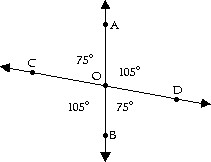Solve the equation.2(p + 5) = 6(p + 1)
A. 3
B. 1
C. 9
D. 15
Answer: B
Mathematics
You might also like to view...
Identify the pairs of complementary or supplementary angles, as indicated.Supplementary
A. ?AOD & ?COB; ?AOC & ?DOB B. ?AOC & ?AOD; ?AOD & ?DOB; ?DOB & ?COB; ?COB & ?AOC C. ?AOC & ?AOD; ?AOD & ?DOB D. ?COB & ?BOD; ?BOD & ?AOD
Mathematics
Solve the problem.Suppose G is a graph with 51 vertices and 50 edges. Then
A. G cannot have any circuits. B. G must be a tree. C. G is either a tree or is not connected. D. G cannot have more than one path joining any two vertices. E. none of these
Mathematics
Multiply.(3x + 0.5)(3x - 0.5)
A. 9x2 - 2.5 B. 9x2 - 3x- 0.25 C. 9x2 - 1 D. 9x2 - 0.25
Mathematics
Solve the polynomial equation in the complex numbers.x3 + 2x2 - 6x + 8 = 0
A. {-4, 4} B. {1 + i, 1 - i, 4i} C. {1 + i, 1 - i, 4} D. {1 + i, 1 - i, -4}
Mathematics